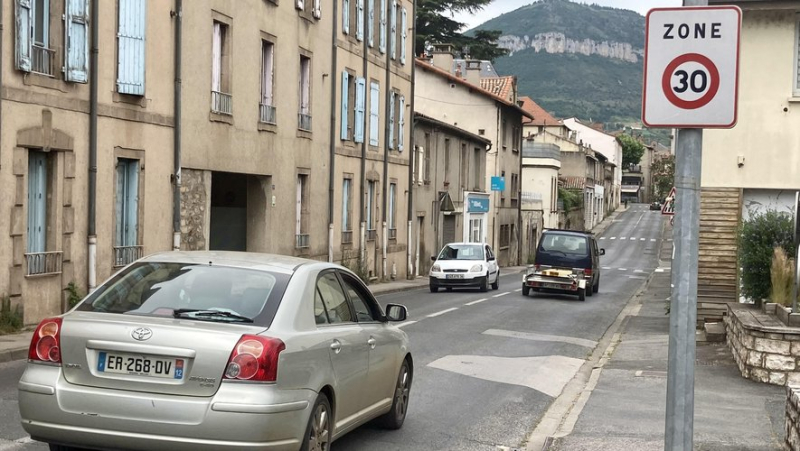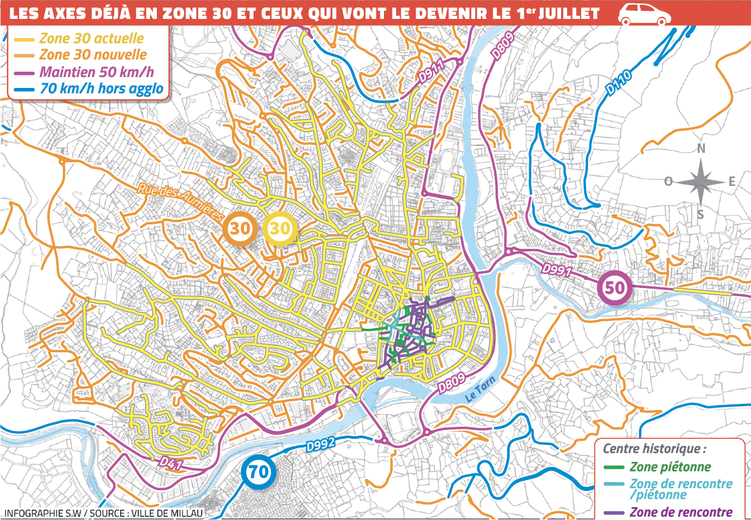“The exception will become the rule”: towards the generalization of 30 km/h in the streets of Millau from July 1

A compter du lundi 1er juillet Millau va rejoindre le club des 200 ville françaises qui ont fait le choix de généraliser la zone 30 km/h sur leurs voiries. Midi Libre – F.MAYET
Nearly 60% of municipal roads are already affected but the City has just adopted the generalization of the limitation with the idea of reducing noise pollution and increasing the safety of soft mobility.
A (r)evolution at reduced speed. From Monday July 1, Millau will join the club of 200 French cities (*) having chosen to limit their roads to 30 km/h. For cars of course, but also heavy goods vehicles, buses and motorized two-wheelers. Although around 60% of municipal roads were already subject to this limitation (including the entire city center), Emmanuelle Gazel is delighted that "the exception becomes the rule !"
For the mayor of Millau, the genesis of the decision is linked to meetings with residents. "Whether on the Friday market, during office hours, neighborhood meetings or even with associations or during seniors' meals, the same request for a speed reduction comes up." The’edile evokes "a feeling of excessive speed throughout the city."< /p>
A shift deemed "logical" by the mayor
Millau already having more than 60% of its municipal roads limited to 30 km/h or 20 km/h, the shift towards generalization seemed "logical& ;quot; for Emmanuelle Gazel. Two gains are expected by the City: reduced noise and safety. Both for motorists and users of soft mobility."Bikes that travel on roads at 30 km/h are safer. Like scooters. This means that bikes and scooters will be less on the sidewalks which will be reserved for pedestrians. Which is the rule. And, frankly, for cars the loss of time remains quite marginal."

All urban roads will be limited to 30 km/h Midi Libre – Sophie Wauquiez
Yannick Douls, elected delegate for mobility and roads, confirms that, "over one kilometer, driving at 30 km/h only increases travel time by 18 seconds. And reducing speed in town is in tune with the times. Road safety launched a petition on May 23 to generalize this measure to all French cities"
"There will be signs at the city entrances, ground markings as well"
The elected official presents the argument for road safety: "on an impact at 50 km/h, the pedestrian does not have only a 20 to 30% chance of survival. At 30 km/h the chances rise to 80-90% for the injured pedestrian. at minus 3 decibels with a drop in speed of 50 to 30 km/h.
There remains the question of the practical implementation of this new speed limit on Monday July 1. "There will be much fewer indicator signs," rejoices Emmanuelle Gazel. "Indeed we are going from an exception to a general rule. There will be signs at the city entrances, as well as ground markings. "
Laurent Carrière, general director of Millavois technical services, mentions "the removal of 150 to 180 panels installed, until now, in the neighborhoods. We indeed had a street in a 30 km/h zone, the neighboring street at 50 km/h… " After Monday July 1st this last limitation will only remain in force "on the seven departmental roads which cross Millau.& ;quot;
Hill 415, special case
Emmanuelle Gazel does not forget two special cases: hill 415 and the departmental road which crosses Saint-Germain. "For these axes we organized public consultation meetings to hear the wishes of the residents. Unanimously the passage into the 30 km/h zone was approved by the residents present." The’edile remembers "several petitions for hill 415, including one recently which gathered more than 300 signatures. It’is a very busy urban boulevard."
(*) Lille, Paris, Clermont-Ferrand, Limoges, Lyon, Bordeaux, Grenoble, Montpellier, Besançon, Nancy, Metz, Nantes, Rennes, Toulouse, Limoges. It was Graz, in Austria, which was the first European city to claim to be City 30 in 1992. In France it was not until 2005 that Fontenay-aux-Roses, in the Parisian suburbs, became the first French city 30 followed by Nogent-sur-Marne in 2006 and Sceaux in 2007. I subscribe to read more




